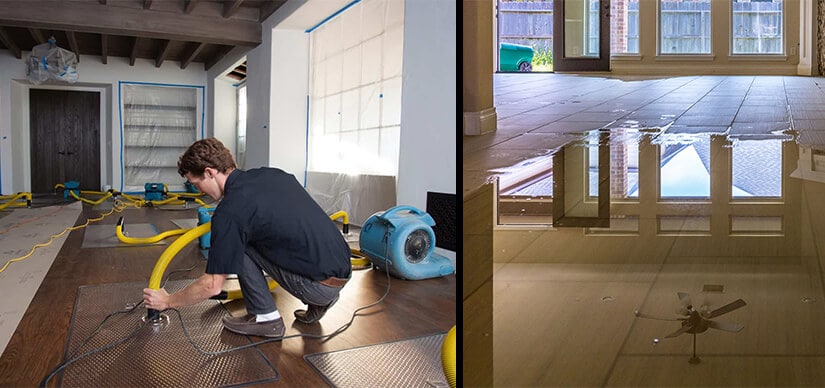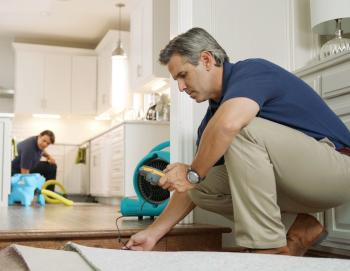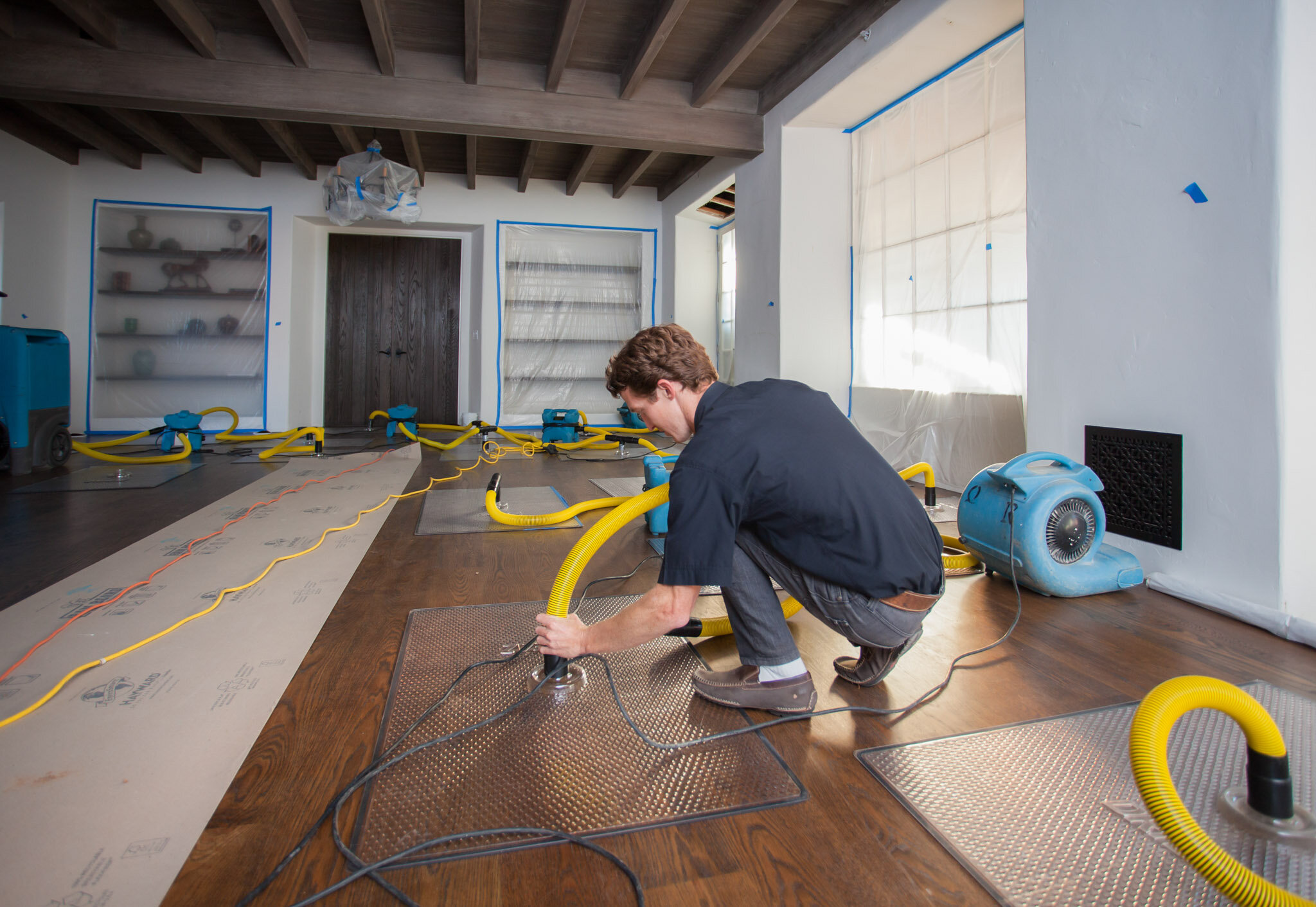Water Damage Restoration 101: Understanding the Process and Cost
Water damage can strike suddenly, leaving homeowners in a state of confusion. Comprehending the restoration process is vital for efficient healing. From reviewing the damage to choosing the right provider, each action influences the general end result and cost. Factors such as the sort of water damage and necessity additionally play a significant function. What are the specific strategies made use of in remediation, and just how can one plan for possible costs?
Types of Water Damage

First Analysis and Examination

Water Removal Methods
Adhering to the initial evaluation, effective water removal methods are employed to mitigate damage and protect against more concerns. These methods entail using customized tools such as industrial-grade vacuum cleaners and completely submersible pumps - Water Damage Restoration. The option of method depends upon the volume of water existing and the kind of products impacted. For standing water, submersible pumps are normally utilized for quick removal, while vacuums are ideal for extracting water from carpets and furniture. Furthermore, advanced methods like water extraction mats might be utilized for hard-to-reach locations - Water Damage Restoration. The objective is to eliminate as much water as feasible, lessening the capacity for mold and mildew growth and structural damage. Trigger and effective water extraction is essential in the overall water damage repair procedure
Drying Out and Dehumidification Process
Once the water extraction is complete, the drying out and dehumidification process comes to be important to bring back the damaged location. This stage typically uses industrial-grade dehumidifiers and air movers to properly minimize moisture degrees. The dehumidifiers pull in moist air, removing excess moisture, while air movers distribute air to speed up dissipation. Surveillance equipment is frequently used to track moisture and temperature level degrees, making sure perfect drying out conditions. The duration of this process can differ depending on the extent of the water damage and environmental variables. It is vital to completely dry all influenced products, including walls, floor covering, and home furnishings, to avoid mold growth and structural damage. Appropriate implementation of this action is critical for an effective reconstruction result.
Cleaning Up and Sanitizing Affected Areas
A detailed preliminary assessment and examination of affected locations is vital to identify contamination degrees once the drying process is full. Water Damage Restoration. Efficient cleansing methods and ideal products should after that be employed to eliminate particles and stains. Ultimately, sanitization and sanitation methods are crucial to guarantee that damaging virus are removed, restoring the room to a secure condition
Preliminary Evaluation and Inspection
Prior to starting any type of repair initiatives, a comprehensive preliminary assessment and examination of the impacted locations are crucial for efficient cleansing and disinfecting. This process includes identifying the extent of water damage, figuring out the resource of the water breach, and evaluating the products influenced. Inspectors usually search for indicators of mold growth, structural stability issues, and damaged belongings. The analysis additionally includes checking moisture levels utilizing specific equipment to ensure no hidden water pockets stay, as these can lead to additional difficulties. Documenting the searchings for is necessary for preparing the following action in the reconstruction process. A detailed initial assessment allows reconstruction specialists to design a targeted strategy for efficient cleansing and disinfecting, ultimately decreasing damage and health dangers.
Cleansing Methods and Products
Effective cleaning and disinfecting of water-damaged locations need a selection of methods and items customized to the details products affected. For permeable surfaces like drywall and carpets, extraction approaches are important to eliminate excess dampness, followed by deep cleaning with specialized detergents. Non-porous materials such as floor tile or steel can be cleansed making use of commercial-grade cleaners that efficiently remove contaminants. Heavy steam cleaning is an additional efficient strategy, particularly for rugs and furniture, as it utilizes heats to eliminate germs and mold and mildew (Flood Cleanup Services). In addition, eco-friendly products are increasingly prominent for their safety and efficiency - Water Extraction And Drying. Inevitably, selecting the appropriate cleaning methods and items not just assures instant cleanliness but also aids in preventing more damage and wellness threats connected with water intrusion
Sanitization and Disinfection Approaches
When resolving you can try these out water damage, appropriate sanitization and sanitation techniques are necessary to ensure the security and health of the damaged setting. After preliminary cleaning, surfaces have to be treated with appropriate anti-bacterials to remove pathogens, mold, and bacteria that grow in damp problems. Common approaches include using EPA-approved chemical anti-bacterials, which can be used via spraying or wiping methods. In addition, ultraviolet (UV) light systems can effectively sterilize areas by reducing the effects of microorganisms without extreme chemicals. The selection of approach commonly depends upon the kind of products affected and the level of contamination. Inevitably, thorough sanitization not only brings back a secure home but also aids protect against future wellness threats connected with sticking around moisture and mold and mildew development.

Repairs and Restoration Options
Examining the damage triggered by water direct exposure is important for figuring out the suitable repairs and reconstruction options. Home owners might deal with numerous issues, consisting of harmed drywall, warped floor covering, and jeopardized structural elements. Relying on the level of the damage, repair work might entail changing sections of drywall, mounting new floor covering, or strengthening architectural beams. In situations of serious damage, full replacement of affected materials could be needed. Furthermore, professional restorers typically suggest utilizing wetness meters to assess surprise dampness degrees prior to selecting the very best program of activity. It is essential to act quickly to avoid mold growth and more degeneration. Selecting the right alternatives not only brings back the home yet additionally assures long-term safety and functionality.
Variables Affecting Restoration Prices

The level of water damage directly affects the remediation sets you back home owners can anticipate to incur. Aspects such as the source of the water, the duration of exposure, and the affected materials substantially affect prices. For example, clean water damage from a damaged pipe is generally less pricey to bring back contrasted to damage triggered by sewer. Additionally, the degree of contamination determines the requirement for specialized cleansing and disposal solutions, even more enhancing costs. Geographic place likewise contributes, as regional labor prices and availability of remediation solutions can vary. Finally, the seriousness of the reaction affects prices; quicker treatments usually cause lower total costs by preventing more damage. Recognizing these factors is vital for property owners when estimating reconstruction prices.
The three primary types of water damage are classified based on contamination degrees: tidy water, grey water, and black water. A comprehensive first analysis and inspection are essential actions in the water damage repair procedure. For standing water, completely submersible pumps are commonly utilized for quick elimination, while vacuum cleaners are suitable for removing water from carpetings and furniture. The degree of water damage straight affects the repair costs home owners can expect to sustain. Tidy water damage from a busted pipeline is usually less pricey to restore contrasted to damage created by sewage.